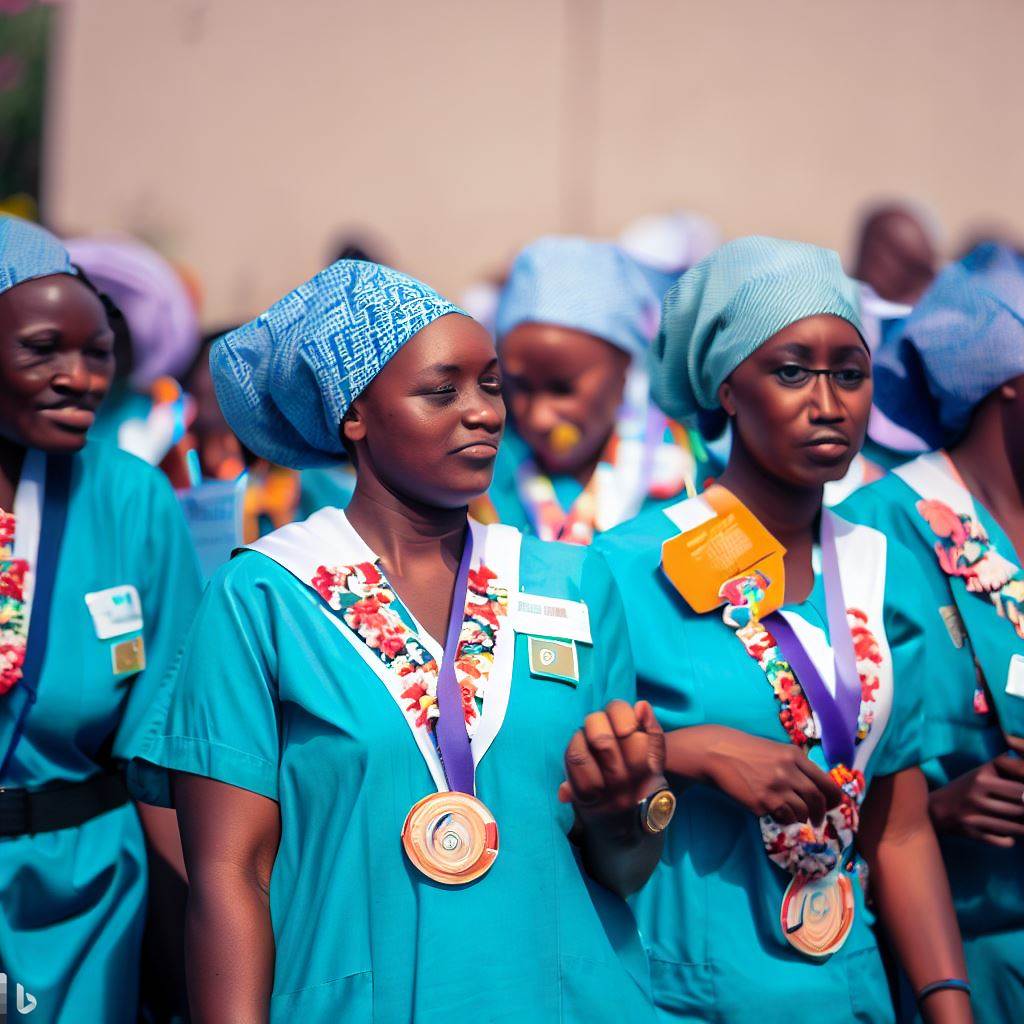Introduction
In this blog, we will discuss the common misconceptions about doctors in Nigeria. It is important to address these misconceptions as they can lead to misunderstandings and distrust in the healthcare system.
These misconceptions can have far-reaching effects, leading to misunderstandings and eroding trust in the country’s healthcare system.
With this blog, we seek to address these notions and provide an accurate portrayal of the remarkable dedication and expertise of Nigerian doctors.
Join us as we delve into the reality behind these perceptions, debunk myths, and showcase the unwavering commitment of healthcare professionals in Nigeria.
By dispelling these misconceptions, we hope to foster a better understanding of the invaluable role doctors play in providing quality healthcare to the nation’s population.
Lack of Qualifications and Competency
Doctors in Nigeria are often perceived to lack the necessary qualifications and competence to provide quality healthcare.
This misconception stems from a lack of awareness about the rigorous educational requirements and licensing process.
Facts about the educational requirements and licensing process for doctors in Nigeria
In order to become a doctor in Nigeria, individuals must complete a Bachelor of Medicine, Bachelor of Surgery (MBBS) degree from a recognized university.
This typically takes six years of intensive study, including theoretical knowledge and practical clinical experience.
After obtaining the MBBS degree, doctors are required to undergo a one-year internship in an accredited hospital.
Upon completion of the internship, they must pass the Medical and Dental Council of Nigeria (MDCN) examination to obtain their practicing license.
Success stories of Nigerian doctors who have excelled internationally
- Dr. Ngozi Okonjo-Iweala, a Nigerian physician, served as the Managing Director of the World Bank and was recently appointed as the Director-General of the World Trade Organization (WTO).
- Dr. Bennet Omalu, a forensic pathologist from Nigeria, discovered chronic traumatic encephalopathy (CTE) and his work was featured in the movie “Concussion.”
- Dr. Oluyinka Olutoye, a Nigerian-born surgeon, successfully performed a complex surgery on a fetus in the womb, making international headlines.
- These success stories demonstrate the high level of competence and expertise possessed by Nigerian doctors.
Basically, the misconception that Nigerian doctors lack qualifications and competence is unfounded. The educational requirements and licensing process ensure that doctors in Nigeria are well-trained and equipped to provide quality healthcare.
The success stories of Nigerian doctors who have excelled internationally further exemplify their competence and expertise.
It is important to dispel these misconceptions and recognize the contributions of Nigerian doctors to the field of medicine on a global scale.
Read: Cardiovascular Technologist: A Growing Profession in Nigeria
Inadequate Healthcare Facilities and Resources
Many people mistakenly believe that healthcare facilities and resources in Nigeria are inadequate, leading to subpar medical care.
Challenges faced by doctors due to insufficient infrastructure
- Limited access to modern medical equipment and technology hinders accurate diagnosis and treatment.
- Inadequate hospital bed capacity results in overcrowding and compromised patient care.
- Shortage of essential medicines and supplies often forces doctors to make difficult choices.
Initiatives taken by Nigerian doctors to improve healthcare facilities
- Formation of professional associations to advocate for better infrastructure and resource allocation.
- Collaboration with international organizations to secure funding for facility upgrades and equipment procurement.
- Medical training programs focused on effective resource management to optimize existing facilities.
Partnerships and collaborations impacting healthcare resources in Nigeria
- Public-Private Partnerships (PPPs) have successfully established new hospitals and clinics in underserved areas.
- International organizations partnering with Nigerian government agencies to improve healthcare infrastructure.
- Medical missions organized by foreign medical teams help bridge the resource gap for short periods.
Dispelling the misconception reveals that Nigerian doctors are proactive in tackling inadequate healthcare facilities and resources. Despite facing challenges, they actively advocate for improved infrastructure and resource allocation.
The Nigerian Medical Association (NMA) and other professional associations raise concerns with relevant authorities, striving for positive change.
Collaborations with international organizations provide support, funding, and training programs to enhance healthcare facilities.
The World Health Organization (WHO) and other partners invest in hospital infrastructure and access to quality healthcare.
Resource management initiatives equip doctors with skills to optimize existing resources, maximizing their impact. Partnerships and collaborations like Public-Private Partnerships (PPPs) establish new hospitals and clinics in underserved areas, bridging the resource gap.
Medical missions led by foreign teams offer temporary relief and knowledge transfer to Nigerian doctors, contributing to capacity building.
Through these efforts, Nigerian doctors actively work towards an improved healthcare system, fostering hope for a brighter healthcare future in Nigeria.
Read: Earnings and Job Prospects for Cardiovascular Technologists in Nigeria
Doctor-Patient Relationship and Communication
In Nigeria, there is a misconception surrounding the doctor-patient relationship and communication.
Many people believe that doctors are unapproachable and do not communicate effectively with their patients. This misconception stems from various factors, including cultural barriers and lack of trust.
Cultural barriers that affect doctor-patient interactions in Nigeria
Cultural barriers play a significant role in hindering effective communication between doctors and patients in Nigeria. One major barrier is the hierarchical nature of Nigerian society.
Many patients feel intimidated by doctors due to their perceived authority and status. This power dynamic makes it difficult for patients to express their concerns and actively participate in their healthcare decisions.
Furthermore, cultural norms regarding respect and deference to authority figures often discourage patients from asking questions or seeking clarification from doctors. This lack of open communication can lead to misunderstandings, misdiagnosis, and ineffective treatment.
Efforts made by doctors to improve communication and patient-centered care
Despite these cultural barriers, many Nigerian doctors are actively working towards breaking down communication barriers and providing patient-centered care.
Some doctors are undergoing additional training in communication skills to improve their ability to convey information effectively and listen to their patients’ concerns.
Additionally, healthcare institutions are implementing patient-centered care initiatives, which encourage doctors to involve patients in their healthcare decisions and provide them with the necessary information to make informed choices.
These efforts are aimed at improving doctor-patient relationships and ensuring patients feel heard and understood.
The importance of trust and empathy in the doctor-patient relationship
Trust and empathy are crucial components of a healthy doctor-patient relationship. Doctors need to establish trust with their patients by demonstrating competence, honesty, and respect.
When patients trust their doctors, they are more likely to feel comfortable expressing their concerns and actively participating in their healthcare decisions.
Empathy is equally critical in building strong doctor-patient relationships. Doctors who show empathy by understanding and validating their patients’ emotions and experiences create a safe space for open communication.
By practicing empathy, doctors can gain a deeper understanding of their patients’ needs and tailor their treatment plans accordingly.
In summary, the misconception surrounding the doctor-patient relationship and communication in Nigeria is based on cultural barriers and lack of trust. However, efforts are being made by doctors to improve communication and provide patient-centered care.
Trust and empathy play a crucial role in fostering healthy doctor-patient relationships and ensuring effective healthcare delivery. Breaking down these misconceptions is vital for the overall improvement of healthcare experiences in Nigeria.
Read: Challenges and Prospects of Cardiovascular Technology in Nigeria

Brain Drain and Lack of Job Satisfaction
There is a widespread belief that Nigerian doctors are leaving the country in large numbers due to a lack of job satisfaction and opportunities for growth.
The reasons behind the brain drain of Nigerian doctors
- Limited career advancement: The Nigerian healthcare system often lacks opportunities for doctors to advance their careers and take on more challenging roles.
- Poor working conditions: Many doctors face difficult working conditions, including long hours, lack of resources, and inadequate infrastructure.
- Low wages: Doctors in Nigeria often receive low salaries compared to their counterparts in other countries, making it difficult to support themselves and their families.
- Lack of recognition and appreciation: Nigerian doctors may feel undervalued and unappreciated by the government and society as a whole.
- Security concerns: The increasing rate of violence and insecurity in the country makes it less appealing for doctors to stay and practice.
Initiatives to retain doctors and improve job satisfaction
- Increased investment in the healthcare system: The government should allocate more resources to improve infrastructure and provide better working conditions for doctors.
- Competitive salaries: Offering competitive salaries will attract and retain talented doctors, reducing the desire to seek better opportunities abroad.
- Professional development opportunities: Creating avenues for continuous professional development and specialization can enhance job satisfaction and growth.
- Recognition and rewards: Recognizing doctors’ contributions and providing incentives such as awards and promotions can improve their morale and job satisfaction.
- Enhanced security measures: Ensuring the safety of doctors by addressing security concerns can help retain them in the country.
Stories of doctors who have chosen to stay and contribute to the Nigerian healthcare system
Dr. Adebayo, a renowned surgeon, decided to remain in Nigeria despite tempting job offers abroad. He believes in serving his fellow citizens and improving healthcare standards from within.
Dr. Ngozi, a pediatrician, is dedicated to making a difference in the lives of Nigerian children. She has chosen to stay and work towards providing better healthcare access to underserved communities.
By sharing such stories, we can inspire other doctors to stay and contribute to the Nigerian healthcare system despite the challenges they may face.
In review, the brain drain of Nigerian doctors is a real concern. However, initiatives such as improved working conditions, better salaries, and recognition can help retain and attract talented doctors.
By highlighting the stories of doctors who have stayed and contributed, we can showcase the possibilities and opportunities available in Nigeria’s healthcare system.
Read: Mechanical Engineering Internships: Opportunities in Nigeria
Conclusion
It is essential to combat misconceptions about doctors in Nigeria.
Throughout this blog post, we have discussed key points highlighting the importance of dispelling these misconceptions.
Nigerian doctors and healthcare professionals deserve our support and appreciation for their hard work.
By challenging misconceptions, we can promote better healthcare outcomes and improve trust in the medical profession.
It is crucial to recognize that doctors in Nigeria face various challenges but are dedicated to providing quality care.
We must encourage a shift in public perception and eliminate stereotypes that hinder the progress of healthcare in Nigeria.
Supporting Nigerian doctors means supporting the overall healthcare system and the well-being of the Nigerian population.
Let us challenge misconceptions together and promote a more positive and accurate image of the medical profession in Nigeria.




